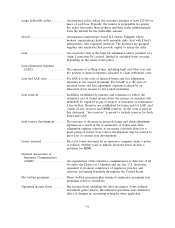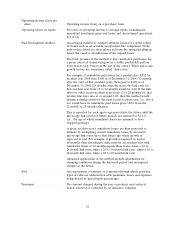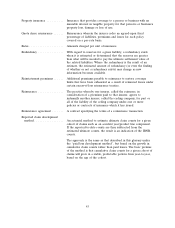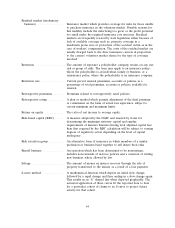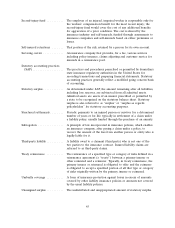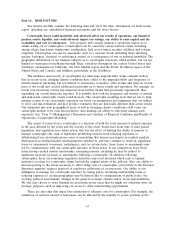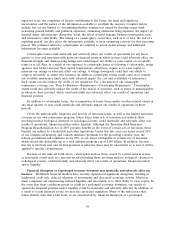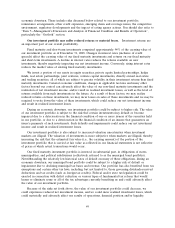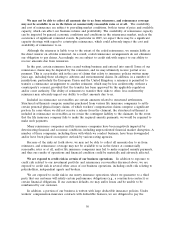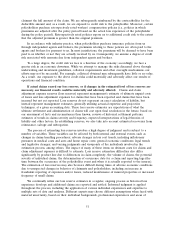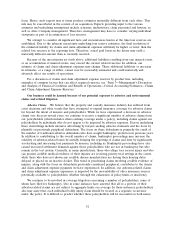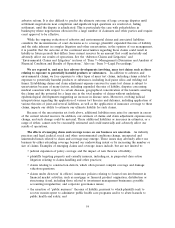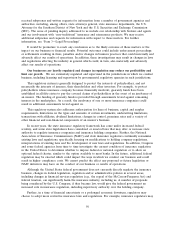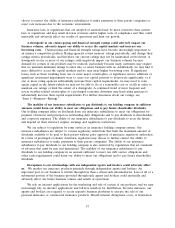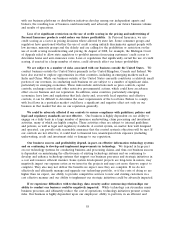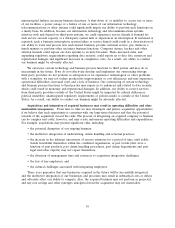Travelers 2008 Annual Report Download - page 61
Download and view the complete annual report
Please find page 61 of the 2008 Travelers annual report below. You can navigate through the pages in the report by either clicking on the pages listed below, or by using the keyword search tool below to find specific information within the annual report.economic downturn. These include risks discussed below related to our investment portfolio,
reinsurance arrangements, other credit exposures, emerging claim and coverage issues, the competitive
environment, regulatory developments and the impact of rating agency actions. You should also refer to
‘‘Item 7—Management’s Discussion and Analysis of Financial Condition and Results of Operation’’,
particularly the ‘‘Outlook’’ section.
Our investment portfolio may suffer reduced returns or material losses. Investment returns are
an important part of our overall profitability.
Fixed maturity and short-term investments comprised approximately 94% of the carrying value of
our investment portfolio as of December 31, 2008. Changes in interest rates (inclusive of credit
spreads) affect the carrying value of our fixed maturity investments and returns on our fixed maturity
and short-term investments. A decline in interest rates reduces the returns available on new
investments, thereby negatively impacting our net investment income. Conversely, rising interest rates
reduces the market value of existing fixed maturity investments.
We invest a portion of our assets in equity securities, private equity limited partnerships, hedge
funds, real estate partnerships, joint ventures, venture capital investments, directly owned real estate
and trading securities, all of which are subject to greater volatility in their investment returns than fixed
maturity investments. General economic conditions, changes in applicable tax laws and many other
factors beyond our control can adversely affect the value of our non-fixed maturity investments and the
realization of net investment income, and/or result in realized investment losses, as well as the level of
returns available from such investments in the future. As a result of these factors, we may realize
reduced returns on these investments, we may incur losses on sales of these investments and we may be
required to write down the value of these investments, which could reduce our net investment income
and result in realized investment losses.
During an economic downturn, our investment portfolio could be subject to higher risk. The value
of our investment portfolio is subject to the risk that certain investments may default or become
impaired due to a deterioration in the financial condition of one or more issuers of the securities held
in our portfolio, or due to a deterioration in the financial condition of an insurer that guarantees an
issuer’s payments of such investments. Such defaults and impairments could reduce our net investment
income and result in realized investment losses.
Our investment portfolio is also subject to increased valuation uncertainties when investment
markets are illiquid. The valuation of investments is more subjective when markets are illiquid, thereby
increasing the risk that the estimated fair value (i.e., the carrying amount) of the portion of the
investment portfolio that is carried at fair value as reflected in our financial statements is not reflective
of prices at which actual transactions would occur.
Our fixed maturity investment portfolio is invested, in substantial part, in obligations of states,
municipalities, and political subdivisions (collectively referred to as the municipal bond portfolio).
Notwithstanding the relatively low historical rates of default on many of these obligations, during an
economic downturn, our municipal bond portfolio could be subject to a higher risk of default or
impairment due to declining municipal tax bases and revenue. Our portfolio has also benefited from tax
exemptions and certain other tax laws, including, but not limited to, those governing dividends-received
deductions and tax credits (such as foreign tax credits). Federal and/or state tax legislation could be
enacted in connection with deficit reduction or various types of fundamental tax reform that would
lessen or eliminate some or all of the tax advantages currently benefiting us and could adversely affect
the value of our investment portfolio.
Because of the risks set forth above, the value of our investment portfolio could decrease, we
could experience reduced net investment income, and we could incur realized investment losses, which
could materially and adversely affect our results of operations, financial position and/or liquidity.
49




